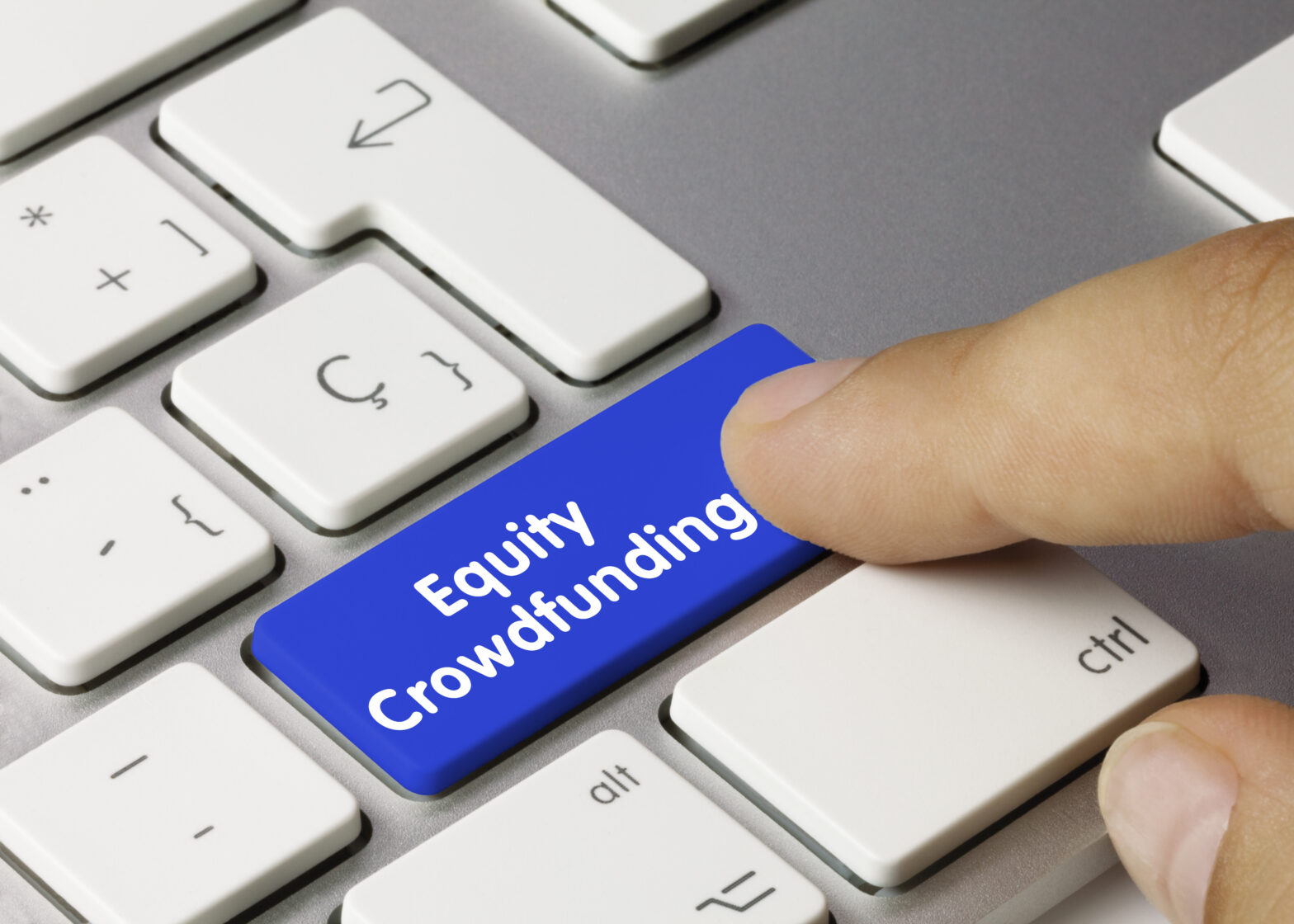If a business needs money to invest in itself – for say expansion, improving facilities or new equipment – it can either seek to borrow money or ask for (capital) investment in return for equity (shares). In recent years, the latter option has been facilitated by the equity crowdfunding market.
In the past start-ups and small businesses would approach specialist investors for money in exchange for equity such as Angel Investors or Venture Capital Trusts (VCTs) – think Dragons Den. However, equity crowdfunding opens up the opportunity for a broader range of people (the crowd) to invest in these types of companies.
It also changes the game; where before a small number of individuals would invest large sums of money, with equity crowdfunding larger numbers of people can invest smaller amounts – but the net result (hitting the funding target) is the same.
Useful link: – Looking for funding? Find the right finance for your business here
For businesses this is great news. Traditionally it was difficult for entrepreneurs and small or start-up businesses to access interested investors with enough money to invest in them. Generally businesses would look within their local or business sector network for investors because it was difficult to connect with anyone outside of those networks.
The equity crowdfunding platforms have changed that. By utilising new technology and the internet they provide businesses seeking investment greater visibility to a crowd of people with money to invest from across the country and in some cases professional investors as well.
For investors equity crowdfunding platforms provide a structure/platform from which they can look at businesses in which they may wish to invest, keep track of their investments and more easily access tax wrappers like Enterprise Investment Schemes (EIS) and Seed Enterprise Investment Schemes (SEIS) that offer tax incentives that can make smaller and start-up company investing more attractive.
Generally the companies raising money from the crowd are not yet listed on a stock market, although as the sector matures this is starting to change. For instance, some AIM listed companies have been raising capital through crowdfunding.
The history of the equity crowdfunding market
Crowd investing is not a new phenomenon, you can trace its roots to the co-operative movement for instance, but today’s equity crowd investing specifically utilises technology to facilitate the connection between businesses seeking capital and investors seeking growth for the capital that they have to invest.
What is perhaps unusual about today’s equity crowdfunding, relative to other types of investment, is that its roots are firmly planted in the creative community. ArtistShare was launched in 2003, Indiegogo in 2008 and Kickstarter in 2009; all of which initially helped the creative community connect with investors.
Some of these platforms offered ‘reward share’ rather than equity in return for investment, but the principle of sourcing money from “the crowd” and using technology to do so was there.
The term ‘crowdfunding’ is believed to have come into use in 2006 – which highlights how young this industry is. The first equity crowdfunding platform in the UK was Crowdcube which launched in 2011 and the first crowdfunding platform to be regulated in the UK was Seedrs in 2012.
How did the equity crowdfunding market develop?
In the film field of dreams there’s a line ‘If you build it he will come’; change he too they and you have summarised crowdfunding’s development in the UK. As the platforms were built, so investors and businesses found them. In 2011 £1.6m was recorded as being raised across 7 deals. In 2015 NESTA recorded deal values across UK equity crowdfunding platforms as £332 million.
In 2015 15.6 per cent of all seed and venture capital investing in the UK hailed from equity crowdfunding and there was 295 per cent year-on-year growth in the same year (£332 million, compared with £84 million in 2014) according to Nesta in its pushing boundaries report 2016. Yet there is still a long way to go; 15.6 per cent is a small slice of the UKs seed and venture capital investing market for instance.
Evolving structures
Equity crowdfunding platforms are not all the same, there are a number of different fee models and structures for raising capital and platforms will offer a combination of the structures listed below:
- Lead investor: A Venture Capital investor (VC) or lead investor is needed for each funding round.
- Relationship: the platform takes an interest in the businesses raising capital on its platform and provides guidance over a period of years.
- Expert panel: a panel of experts offers analysis and guidance to investors and businesses raising money on the platform.
- Tailored crowds: there are fewer investors but the money that they have to invest is higher (usually a minimum amount is set).
- Scale: bigger crowds, but minimum investment levels are lower.
- Business set valuation: the business pitching for investment is responsible for providing its valuation. This is the most common model.
- Crowd set valuation: where the valuation of the business is set based on the interest and investment of the crowd.
- Equity stake: the platform takes an equity stake in exchange for hosting your businesses pitch. Generally there is an equity stake and an arrangement fee.
- Arrangement fee: the platform charges an arrangement fee, usually 5 per cent to 7.5 per cent of the money raised, contingent on a successful fund raising round.
- Investor profit cut: some platforms have begun to take a cut of investor profits.
- Direct ownership: shareholders are responsible for holding and administering their own shares, meaning they talk directly to the business that they are invested in.
- Nominee ownership: the platform is responsible for holding the shares for an individual, so they carry out the administration and could advocate for shareholders in certain situations.
Who are the key players in the equity crowdfunding market?
The seven key players in the UK equity crowdfunding market are:
The UK’s oldest player in the equity crowdfunding market and has over 400,000 registered investors to its platform, making it one of the biggest platforms. Professional investors and venture capital firms invest alongside the crowd. They offer both a direct and nominee structure.
Further reading on raising money on Crowdcube
One of the first regulated crowdfunding sites and like Crowdcube offers scale; it is one of the UK’s largest platforms. Professional and venture capital firms invest alongside the crowd and it has European as well as UK investors. It provides administration for investors and businesses and offers a multi-currency option.
Further reading on raising money on Seedrs
As the name suggests, an Angel investor-led platform – meaning there needs to be a lead investor for every deal. Businesses looking for investments are researched and the platform claims that the selection process means only the best opportunities make it to pitch to their crowd.
A smaller platform in the equity crowdfunding market. It also offers businesses access to their crowd of registered users and professional investors. Where it differs to the big three above is that businesses can choose share funding or bond funding (effectively a choice between investment in exchange for equity or a loan with interest and capital repayment requirements).
Seeks to offer businesses within the European economic area access to a crowd of investors from Europe and beyond. It is a Nordic company that has recently entered the UK’s equity crowdfunding market and is seeking to challenge the leading platforms. Like those platforms professional investors can invest alongside the crowd.
Uses its reporting tools as a differentiator, with the focus on maintaining contact with your business and helping you to stay in touch with your investors after fund raising. It also offers access to the crowd and professional investors.
Another platform with the pitch ‘invest alongside the professionals’ but for businesses it offers successful fund raisers that are eligible for EIS qualifying the opportunity for additional investment from its own fund, with the potential to double up the investment.
Further reading on raising money on SyndicateRoom
This platform works a little like a venture capital trust but with lower initial investment levels and fees. They have a team of professional investment managers seeking interesting deals that their crowd can invest in. The crowd can choose which business they wish to invest in, but effectively they are picking from a portfolio chosen by that team.
Also see: Crowdfunding UK small business: everything you need to know
What are the industry regulations?
The Financial Conduct Authority (FCA) applied specific regulations to the UK equity crowdfunding sector in October 2014 and, following publication in December 2016 of an interim report, the FCA is expected to update regulation for the equity crowdfunding platforms in 2017.
These regulations were focused on protecting investors from what the regulator perceives to be ‘high-risk investments’ in unlisted companies. The key impact has been on the type of investors that the platforms and the businesses pitching for investment on them can market to. They are defined as:
- Those who take regulated advice
- Those who qualify as a high net worth or sophisticated investor (i.e. investors with more than £100,000 to invest or with investments in these types of companies within the last two years)
- Or those who confirm that they will invest less than 10 per cent of their net assets in this type of security
The equity crowdfunding platforms are responsible for ensuring that investors meet the FCAs criteria.
What do you need to do to apply?
Every platform has its own criteria for application, but it is worth doing your research before you do. You will need a business plan and details of the company financials, as well as a pitch video that will be hosted on the crowdfunding platform.
However, successful fund raisers tend to go a step further than that:
There are many businesses applying so do your research: You are one of many, so you need to approach the platform in the same way that you would approach a job interview; do your research. Understand how the platform operates, what it is looking for. Know what – if any – businesses in your sector it may have worked with in the past and how they fared with their investment community. Understand what the platform will ask of you and have those materials to hand.
- Consider your marketing plan: You may be pitching on a platform but there are investors everywhere. Think about local networks. Look at opportunities to raise your companies profile and in so doing be more appealing to investors. Consider if there are media opportunities to discuss what you do in some way. Work with a local venture capital or business angel network if you can. Don’t expect the platform to do all of the work for you, think about what you can do and bring to the table as well.
- Make sure the video is slick: You have one chance to win over the platform and investors, don’t miss it due to shoddy presentation. Yes your business plan needs to be attractive, but whoever is presenting also needs to appeal to viewers. It is also worth investing in a designer to make sure that your business plan document and one pager read well and look good.
- Consider the needs of the investor: the platforms need strong business proposals and pitches for their crowd of investors, but they are serving those investors – so what is in it for them? If you were seeking to invest in a company what would you want to know? .Consider returns, what is happening in the rest of the sector and market and why you are the best bet. What has come before – for instance if you follow on the heels of a well-known failure why should investors believe that you are any different? How long should they expect to wait before they see returns? What will you be doing to get them?
And finally – what is in it for my business, apart from capital?
What can be overlooked when considering if the equity crowdfunding market is right for your business is the value, other than the capital that they invest, of the ‘crowd’ itself. Crowdfund investors often become committed advocates for the businesses that they invest in, they want to see your business succeed. Many will have skills or contacts that are useful to your business. Think of these potential investors as a network of advocates and influencers, as well as providers of capital and consider what, if anything, they could do to help your business.
This article was provided by BusinessAgent.com.





